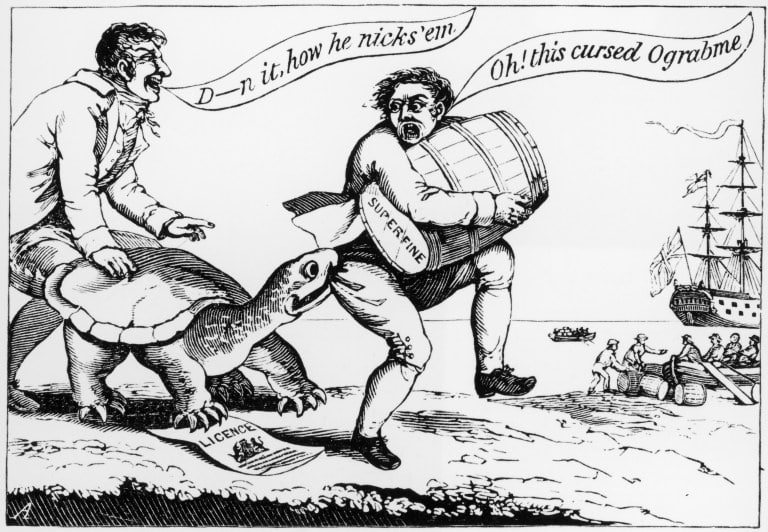The Embargo Act of 1807 was enacted by Congress during the presidency of Thomas Jefferson against Great Britain during the Napoleonic Wars.

It was a response to Great Britain's policy of impressment and the Chesapeake-Leopard Affair.
Legislation
Passed on December 22, 1807, the Act:
- laid an embargo on all ships and vessels under U.S. jurisdiction,
- prevented all ships and vessels from obtaining clearance to undertake voyages to foreign ports or places,
- allowed the President of the United States to make exceptions for vessels under his immediate direction,
- authorized the President to enforce via instructions to revenue officers and the Navy,
- was not constructed to prevent the departure of any foreign ship or vessel, with or without cargo on board,
- required a bond or surety from merchant ships on a voyage between U.S. ports and
- exempted warships from the embargo provisions.
This shipping embargo was a cumulative addition to the Non-importation Act of 1806 (2 Stat. 379), this earlier act being a "Prohibition of the Importation of certain Goods and Merchandise from the Kingdom of Great Britain"; the prohibited imported goods being defined where their chief value which consists of leather, silk, hemp or flax, tin or brass, wool, glass; in addition paper goods, nails, hats, clothing, and beer.
Embargo Act of 1807 Impact
The embargo destroyed the economy of the United States. It hurt the industrialized North because they could not import the goods they produced, and it hurt the Southern farmers whose crops could not be sold overseas. It had very little effect on Great Britain.
Even though the embargo stopped American exports from leaving the harbor for Britain, it did not stop the British from exporting their goods to America through Canada. Smuggling became commonplace, as was the enforcement of the law.
American ships rotted in the harbor, and it cost the Gross National Product about 5%.
Politically, the impact hurt the popularity of the Democratic-Republican Party, especially in New England. The case is a rare example of American national foreign policy altering local patterns of political allegiance.
The Embargo Act of 1807 did have one positive impact on the local economy. Americans were forced to rely on themselves and create their own product. It drove down their reliance on foreign exports and helped stimulate some economic growth.
However, the growth could not catch up to the decline.
Consequences
The Embargo was doing little to Great Britain or France, yet Americans suffered. In order to compensate for the loss of American trade, the British began to build up a South American market without any competition from the United States.
President Thomas Jefferson found himself to be a walking contradiction. He had for years been critical of Federalists policies and argued that they often over-reached and violated states' rights. The Embargo Act of 1807 was the same thing that Jefferson had argued against. Jefferson was now supporting legislation that required the Federal government to enforce it.
His political opponents seized on the contradiction, and in the presidential election of 1808, the Federalists showed signs of gaining strength.
Congress passed the Non-intercourse Act in 1809, which failed and then passed the Macon Bill. Both were unsuccessful.
The attempt of Jefferson and Madison to resist aggression by peaceful means gained a belated success in June 1812 when Britain finally promised to repeal her Orders in Council. The British concession was too late, for by the time the news reached America, the United States had already declared the War of 1812 against Britain.
James Madison attempted to restrict foreign trade further with the passing of the Embargo Act of 1813.
After the War of 1812 ended with the Treaty of Ghent, the United States would repeal the acts. They would never again restrict trade with a foreign country as a means to avoid war.
